Lusophone Space
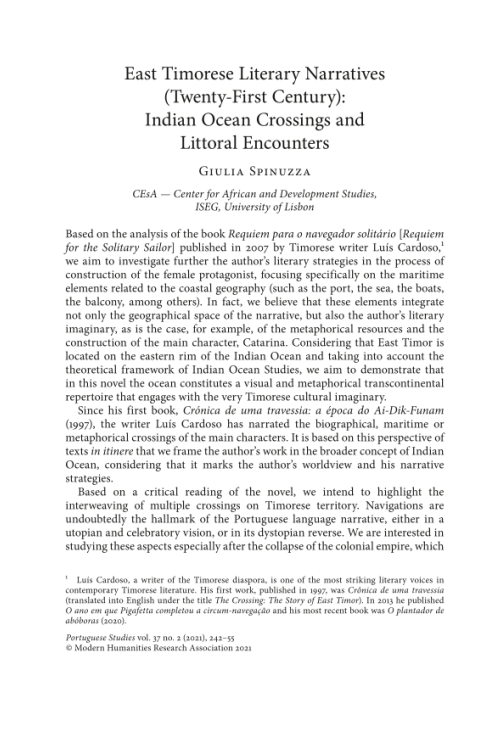
East Timorese Literary Narratives (Twenty-First Century): Indian Ocean Crossings and Littoral Encounters
Abstract:
The aim of East Timorese Literary Narratives (Twenty-First Century): Indian Ocean Crossings and Littoral Encounters is to analyze the book Requiem para o Navegador Solitário (2007) [Requiem for the Lonely Sailor] by Luís Cardoso considering the maritime elements that emerge in the novel and combining Indian Ocean Studies with Gender Studies. Pointing to the Timorese imaginary and the female protagonist’s perspective, we will focus on the elements related to the island’s coast, such as the shore, the sea, ships, sailors, and the interconnection with other islands and territories during the colonial period. In fact, we believe that these elements integrate not only the geographical space of the narrative, but also the literary imaginary, as is the case, for example, of the metaphorical resources and the construction of the main character, Catarina. Considering that East Timor is located at the eastern edge of the Indian Ocean and taking into account the theoretical theory of Indian Ocean Studics, we intend to demonstrate that in this novel the ocean constitutes a visual and metaphorical transcontinental repertoire that relates to the Timorese cultural imaginary itself. We will analyze the connection between the existential trajectory of Catarina, the novel’s female protagonist, the history of East Timor and the Indian Ocean crossings. This text, written in Portuguese by a Timorese author, portrays the complex history of this territory during World War II and offers a unique perspective on Timorese history.
Quotation:
Spinuzza, G. (2021). East Timorese Literary Narratives (Twenty-First Century): Indian Ocean Crossings and Littoral Encounters. Portuguese Studies 37(2), 242-255. doi:10.1353/port.2021.0017.

História de São Tomé e Príncipe: da descoberta a meados do século XIX
Abstract:
In História de São Tomé e Príncipe: da descoberta a meados do século XIX, the author explains how the Portuguese navigators arrived on the islands of São Tomé and Príncipe in the third quarter of the fifteenth century and transformed them into a social context for their development, but in which human and institutional relations were complex and even unbearable for the most disadvantaged, particularly on the island of São Tomé. Conflicts of all kinds worsened, particularly after the transition from a residential to a plantation society, with the intensification of the slave trade and the production and export of sugar. The long distance of the islands from the central power, located in Lisbon, constituted an ingredient that favoured the fomentation of conflicts in which the disrespect for the established rules was permanent and maintained during the period of domination of the native elite since the 17th century, marked around the main families that disputed access to power and control of wealth. The author shows that, despite its harshness, the colonial slave model had dynamics of social mobility that allowed some enslaved people to become free and others to become powerful in economic and political terms, even during the 16th century, becoming dominant until the mid-19th century.
Quotation:
Espírito Santo, A. (2021). História de São Tomé e Príncipe: da descoberta a meados do século XIX. Lisboa: Edições Colibri.
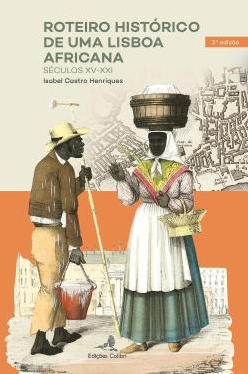
Historical Guide to an African Lisbon
Abstract:
Lisbon, a city of as many valleys and hills as there are myths surrounding its history and the people who invented it, stretches along the Tagus, where the river ends its course through Iberian land and plunges into the Atlantic Ocean. Lisbon was born on the hill of São Jorge Castle, where a Bronze Age settlement left its traces, which crossed with many other marks engraved by Greeks, Phoenicians, Lusitanians, Romans, Visigoths, Arabs, Jews and Christians. A long road of people and cultures, of stories and legends, of gods and heroes who, like Ulysses the mythical founder of the city – Olisipo – which owes its name to him, built and rebuilt this urban space. The aim of Historical Guide to an African Lisbon, XV-XXI Century is to show Lisbon’s Africanness, dispersed in a plurality of memories and immaterial and invisible traces in the days in which we live. History tells us about the settlement and life of thousands of Africans who for centuries took part in the process of building the Portuguese national fact. Travelling through the city, armed with historical knowledge, we are surprised by the vigorous African presence that invaded all spaces of Lisbon society, we reconstruct a hidden Lisbon, submerged by a centuries-old prejudice that still dominates our collective imagination and we understand, with greater clarity, not only behaviours, values, practices that remain in urban daily life, but also the constant reinventions of Portuguese and African identities, present in the country.
Quotation:
Castro Henriques, I. (2021). « Historical Guide to an African Lisbon, XV-XXI Century», versão revista e actualizada, Lisboa, Edições Colibri, 2021.
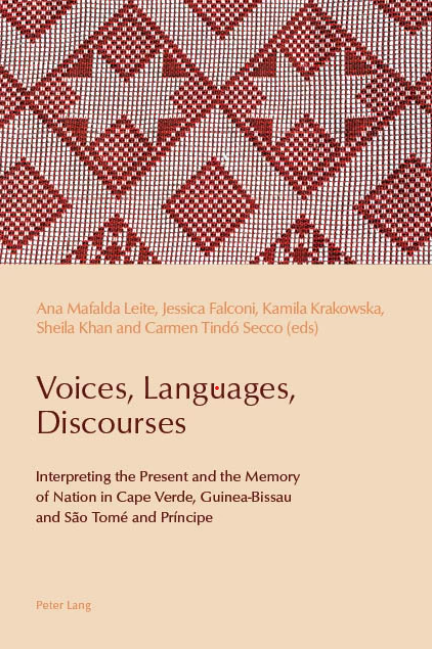
Voices, Languages, Discourses: Interpreting the present and the memory of Nation in Cape Verde, Guinea-Bissau and São Tomé and Príncipe
Abstract:
Voices, Languages, Discourses: Interpreting the Present and the Memory of Nation in Cape Verde, Guinea-Bissau and São Tomé and Príncipe brings together a selection of interviews with writers and filmmakers from Cape Verde, Guinea-Bissau and São Tomé and Príncipe in order to examine representations and images of national identity in these countries’ postcolonial narratives. It continues and completes the exploration of the postcolonial imaginary and identity of Portuguese-speaking Africa presented in the previous interview volume Speaking the Postcolonial Nation: Interviews with Writers from Angola and Mozambique (2014). Memory, history, migration and diaspora are central notions in the recreation and reconceptualisation of the nation and its identities in Cape Verdean, Guinean and São Tomense literary and film culture. By bringing together different generations of writers and filmmakers, with a wide variety of perspectives on the historical, social and cultural changes that occurred in their countries, this book makes a valuable contribution to current debates on post-colonialism, nation and identity in these former Portuguese colonies.
Quotation:
Leite, A., M., Falconi, J., Krakowska, K., Kahn, S., Secco, C. (2020). Voices, Languages, Discourses: Interpreting the Present and the Memory of Nation in Cape Verde, Guinea-Bissau and São Tomé and Príncipe. Oxford, United Kingdom: Peter Lang Verlag. Retrieved Oct 6, 2022, from https://www.peterlang.com/document/1055586
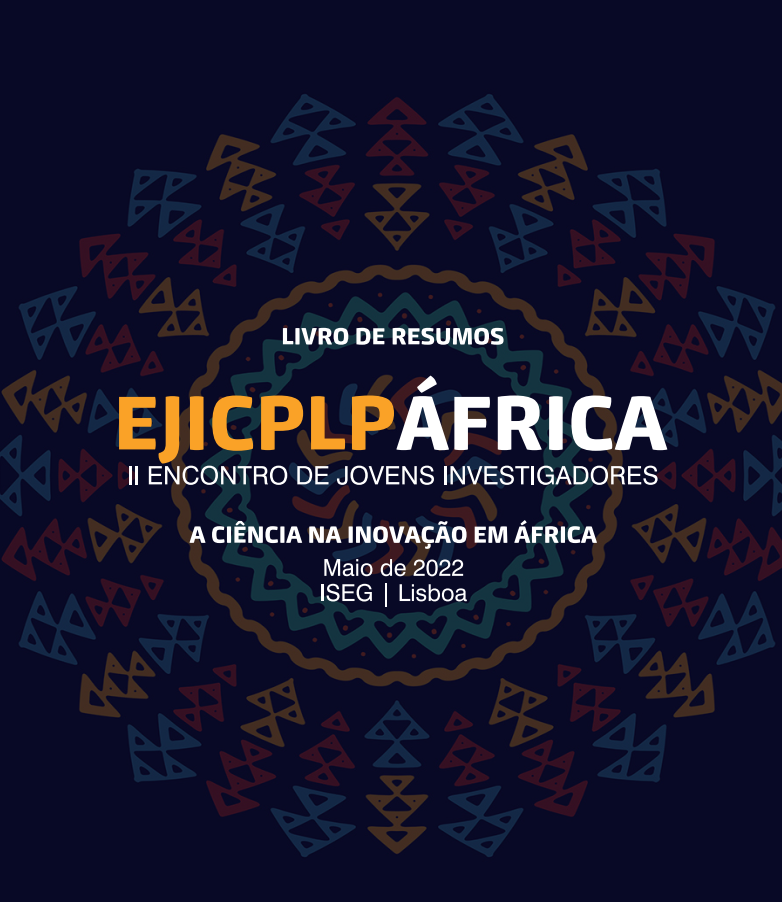
Ebook – EJICPLP Africa: Science in Innovation in Africa
Abstract:
The Meeting of Young Researchers from CPLP on Africa is an inclusive space for debate and scientific dissemination in African studies and in Portuguese language, in an innovative, democratic and multicultural perspective. The success of this project began in 2021, when it was proposed to bring participation and protagonism to young people, as agents of change in a living community in permanent transformation. In this context, the 2nd Meeting was held in May 2022, in Lisbon, where the role of science in innovation in Africa was discussed, exceeding all expectations, whether in the quality of the debates, the excellence and diversity of the works presented, or the massive adhesion of the participants. The Meeting took place thanks to the work carried out by the Organising Committee, an International Scientific Council, with the collaboration of the Centre for African and Development Studies (CEsA), as the proponent entity. in addition to the support of other partner institutions, such as the CPLP, Lisbon City Council (CML), Higher Institute of Economics and Management (ISEG), Catholic University of Angola (UCAN), Union of Portuguese Speaking Capital Cities (UCCLA), Eduardo Mondlane University (UEM – Mozambique), Association of Municipalities for Sustainable Development of the Umbria Region (FELCOS – Italy). The 2º Encontro de Jovens Investigadores da CPLP sobre África – Livro de Resumos was only possible thanks to the collaboration of numerous people, in particular the Organizing Committee, the Scientific Council, the Speakers, the Institutional Partners, the Medias Partners, the Volunteers and the Scientific Community.
Quotation:
D’Abril, Cristina Molares [et al.] (2022). “2º Encontro de Jovens Investigadores da CPLP sobre África. Livro de Resumos”. ISBN: 978-989-54687-3-7
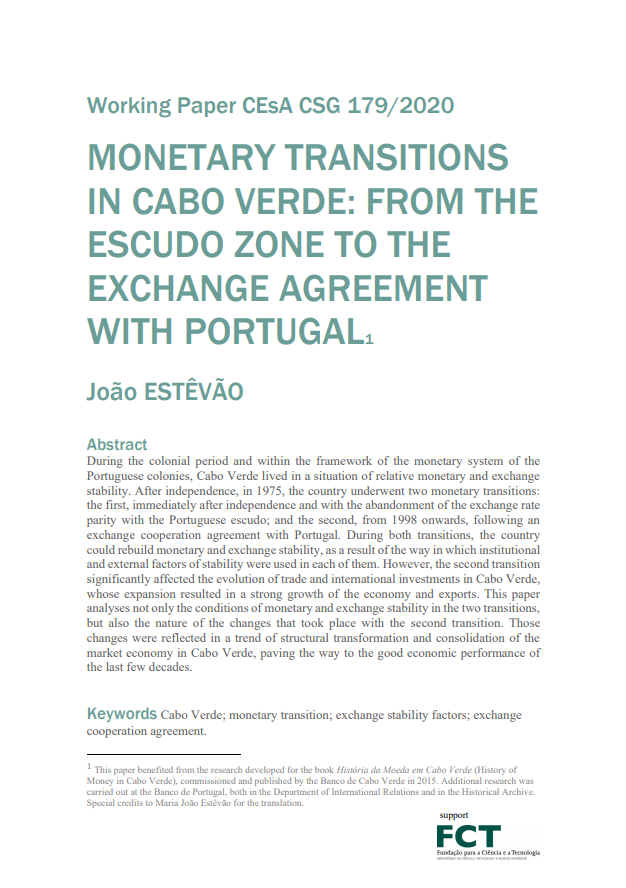
Working Paper 179/2020: Monetary Transitions in Cabo Verde: From the escudo zone to the exchange agreement with Portugal
Abstract:
Monetary Transitions in Cabo Verde: From the escudo zone to the exchange agreement with Portugal studies how, during the colonial period and within the framework of the monetary system of the Portuguese colonies, Cape Verde lived in a situation of relative monetary and exchange rate stability. After independence in 1975, the country underwent two monetary transitions: the first, immediately after independence and with the abandonment of parity with the Portuguese escudo; and the second, from 1998 onwards, following an exchange rate cooperation agreement with Portugal. During both transitions, the country was able to rebuild monetary and exchange rate stability, depending on how institutional and external stability factors were used in each of them. However, the second transition significantly affected the evolution of international trade and investment in Cape Verde, whose expansion resulted in strong growth in the economy and exports. This article analyses not only the conditions of monetary and exchange rate stability in the two transitions, but also the nature of the changes that occurred with the second transition. These changes translated into a trend of structural transformation and consolidation of the market economy in Cape Verde, paving the way for the good economic performance of recent decades.
Quotation:
Estêvão, João (2020). “Monetary transitions in Cabo Verde : from the escudo zone to the exchange agreement with Portugal”. Instituto Superior de Economia e Gestão – CEsA/ CSG – Documentos de Trabalho nº 179/2020.
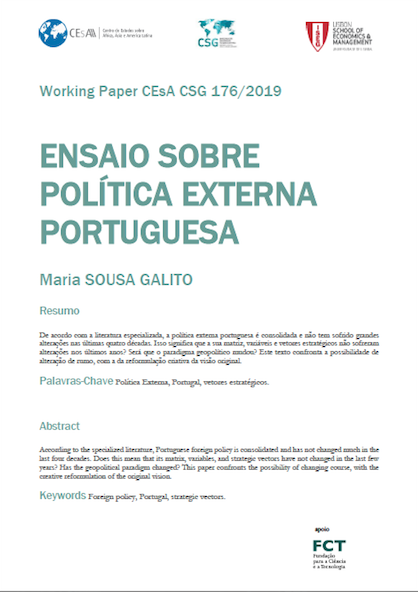
Working Paper 176/2019: Ensaio sobre Política Externa Portuguesa
Abstract:
In general, Portuguese foreign policy is “consolidated” and has not undergone “sudden changes of direction”. According to the national government, the founding matrix remains “well present and consolidated” although “denser, richer, broader”. What exactly does this mean? Our strategic vectors of foreign policy used to be three (Europe, Atlantic and Lusophony). Since the 1990s, some authors have admitted adding a complementary strategic pillar to the previous model. Which one? Three hypotheses. First, security, focusing on the international missions of the Portuguese Armed Forces within the framework of NATO (North Atlantic Treaty Organization), the EU (European Union) or the UN (United Nations). Secondly, cooperation, mainly technical and cultural, with Portuguese-speaking countries, but also with third countries. Thirdly, economic diplomacy, with exports, the diversification of the investment portfolio, the opening of the internal market to the world (and not only to the EU). According to specialized literature, Portuguese foreign policy is consolidated and has not undergone major changes in the last four decades. Does this mean that its matrix, variables and strategic vectors have not changed in recent years? Has the geopolitical paradigm changed? Ensaio sobre Política Externa Portuguesa confronts the possibility of a change of course, with that of the creative reformulation of the original vision.
Quotation:
Galito, Maria Sousa (2019). “Ensaio sobre política externa portuguesa”. Instituto Superior de Economia e Gestão – CEsA/ CSG – Documentos de Trabalho nº 176/2019.





